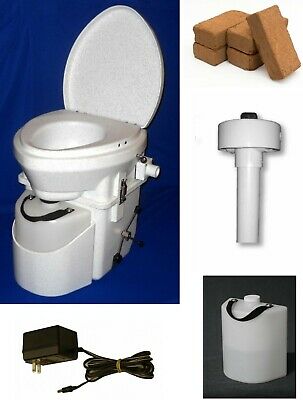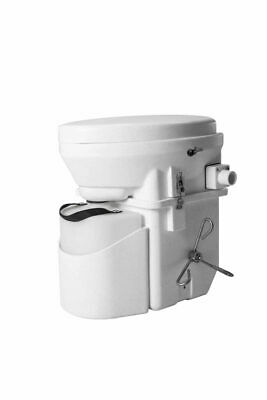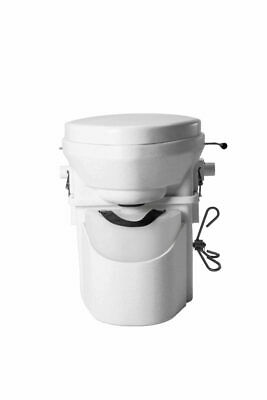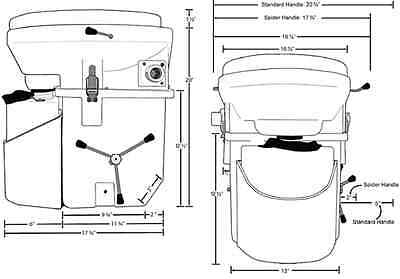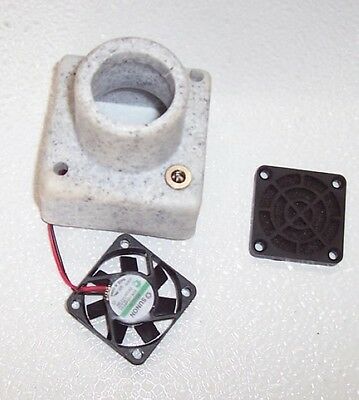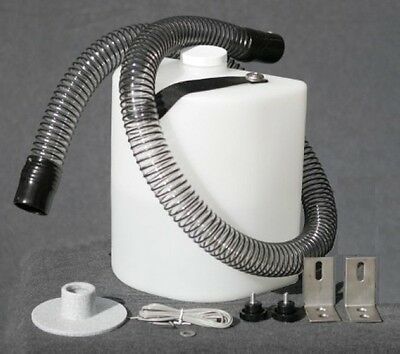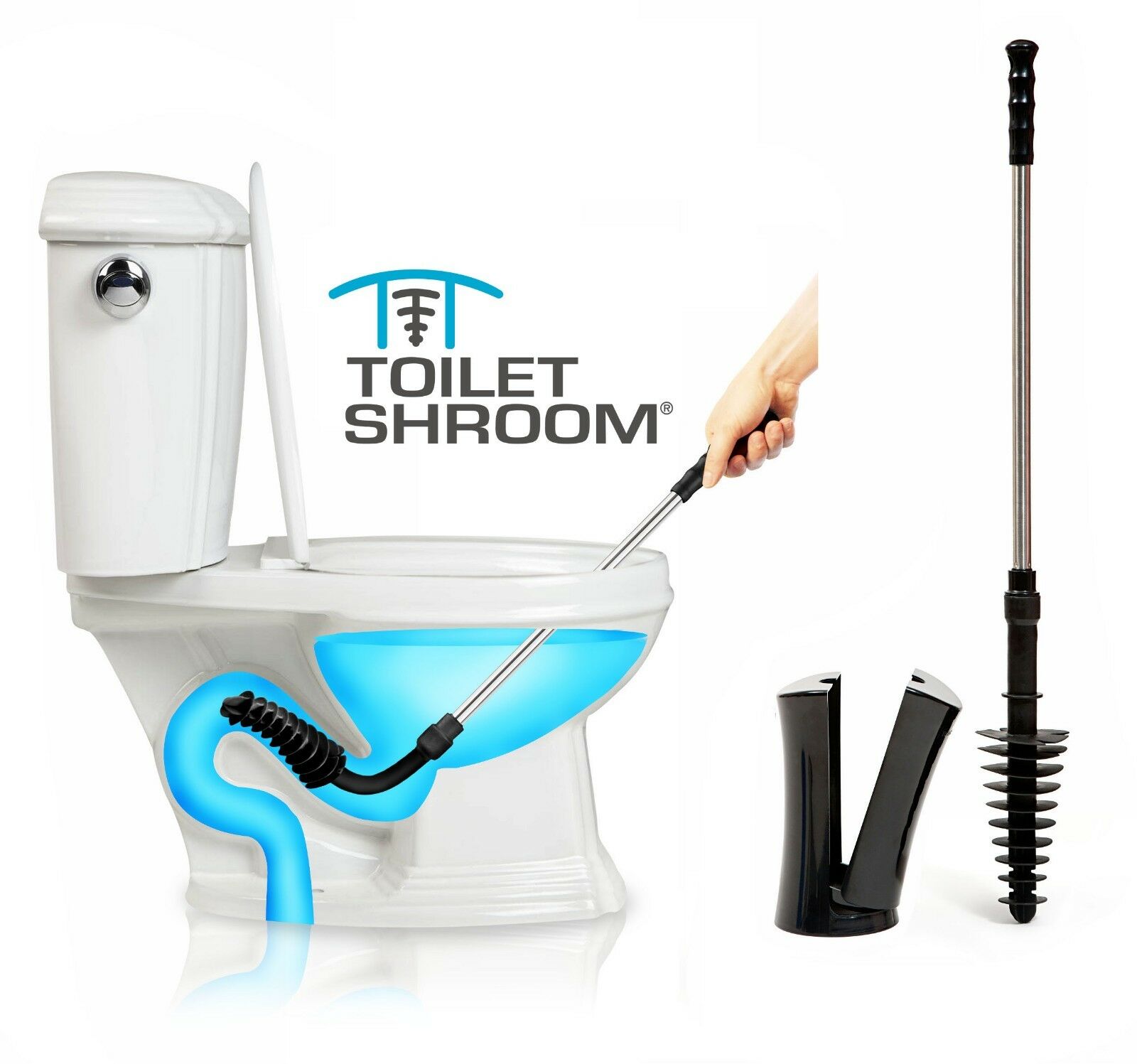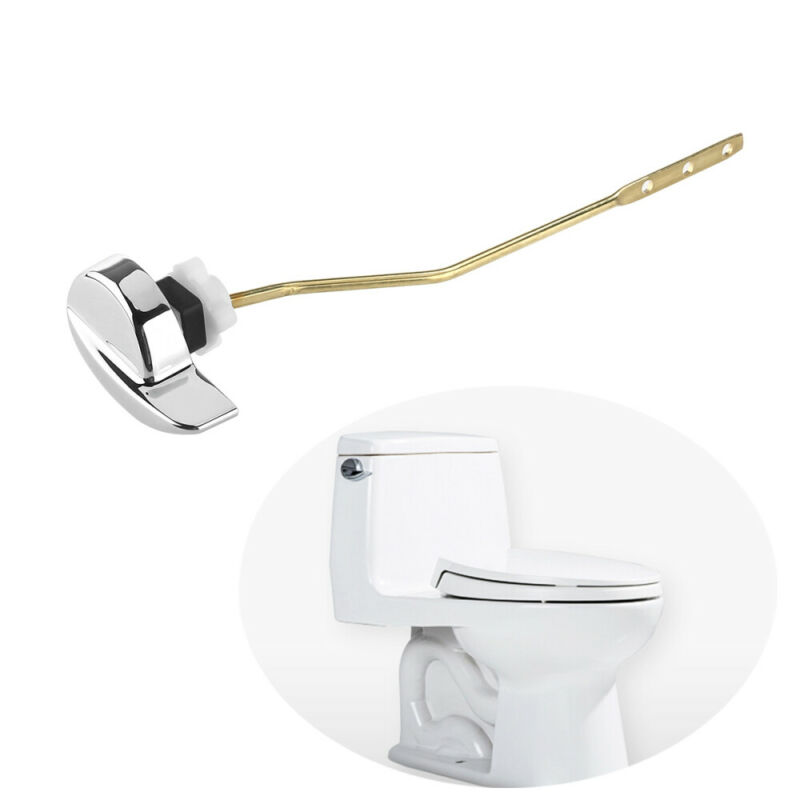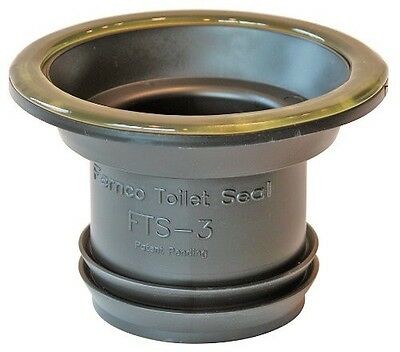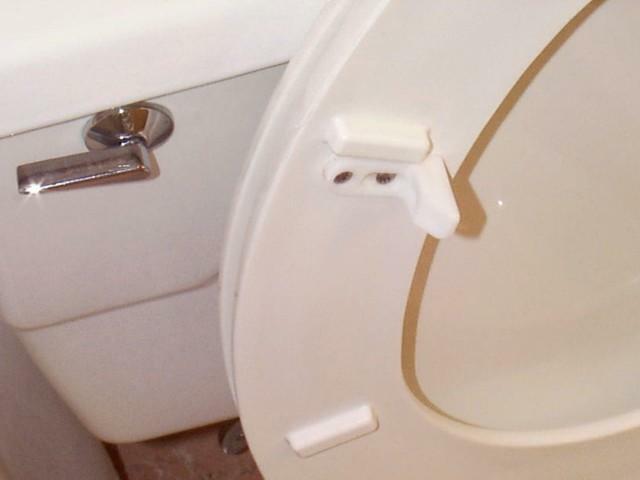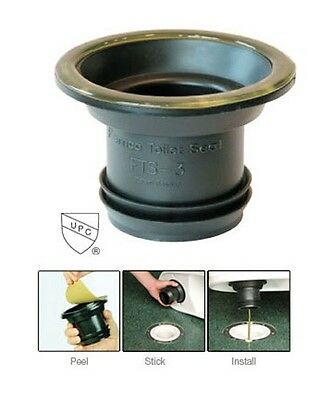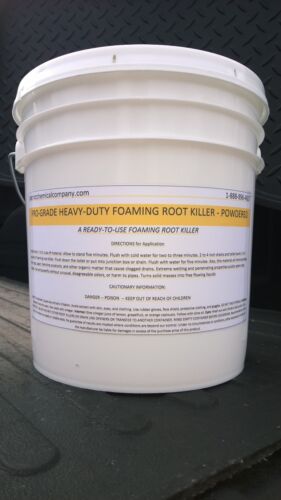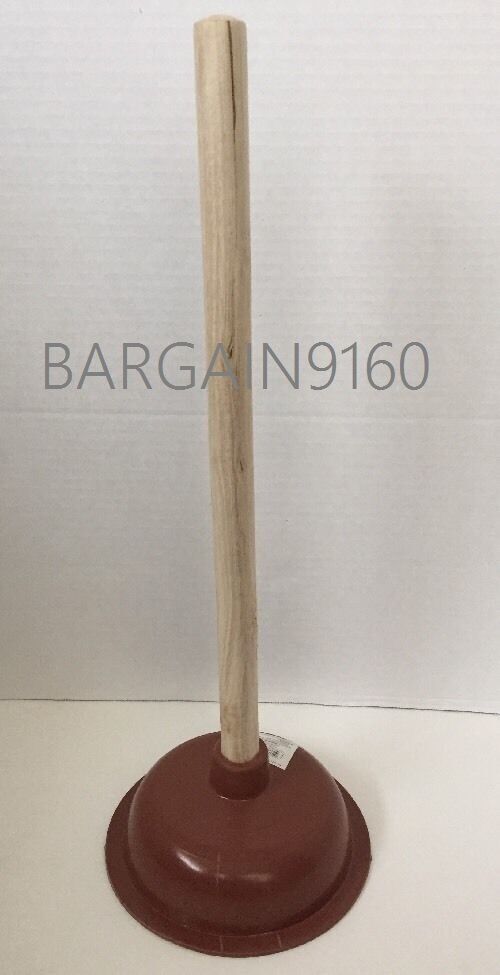-40%
Nature's Head Composting Toilet SUPER PACK
$ 559.15
- Description
- Size Guide
Description
Note: Shipping is delayed approximately 6-10 weeks. DO NOT purchase if you cannot wait 6-10 weeks for this to be shipped.NATURE'S HEAD SUPER PACK
- includes Nature's Head Toilet with spider handle, extra urine bottle (2 bottles in total), PVC Vent Assembly for easy installation through a wall, AC Wall Adapter to plug toilet in to a wall outlet and FIVE bricks of coco coir (ships separately).
OFFICIAL NATIONAL DISTRIBUTOR
for Nature's Head. We ONLY sell composting toilets. We do not sell hardware, solar panels, tiny house plans or anything else. We are the go-to expert on composting toilets. We are here to advise you every step of the way, either on the phone or via email.
PLEASE SEE MY PERFECT FEEDBACK!!
I am not happy until you are happy. NO RISK PURCHASING! Return unused toilet in new condition for full refund (Buyer pays return shipping only). Unlike most sellers there is NO RESTOCKING FEE, or crazy "administration
fee", or anything like that. Straight up and honest - with no BS.
IMPORTANT INFORMATION ON COMPOSTING TOILETS IN GENERAL:
All composting toilets should have a fan, vented to the outside of your structure. This is
vital
to exhaust the moist, stinky air from the toilet. Otherwise, there is nowhere for the moist stinky air to go, except into your dwelling. DO NOT believe claims that a fan is unnecessary.
The best possible solution for the difficult problem of marine and RV sanitation. Also perfect for a cottage or guest room. No odor!
This is the latest composting toilet design and it is amazing. Separation of liquids and solids means enormous capacity. It will hold 60-80 uses, meaning a couple could easily use it all summer without emptying. Very high quality construction with stainless hardware. 5 year guarantee. This unit produces organic compost, rather than toxic sewage. The composted material can be placed on flower beds. Stay in an anchorage or remote campground for weeks and not worry about holding tanks filling up. And let's face it - holding tanks usually stink. Nature's Head does not! This is standard equipment on sailboats costing over 0,000! (The Falmouth Cutter 34). Gain enormous space when you remove the old holding tank. It is compact and will fit where most marine toilets or porta-potties will fit. (measure first please). Priced well below competing units. Made in the USA. I ship to any continental US address and Canada for a low, flat rate, with no handling fee.
Compare!
PRICE
: Nature's Head is about 1/2 the price of other major brands.
CAPACITY
: Many composting toilets are much larger, but the capacity is not improved. That is because most other brands do not separate liquids from the solids. They try to evaporate liquid with heat - with mixed success. If the liquid does not evaporate, you have a sodden, stinking mess - not compost. All of the larger units have "overflow drains", which proves that all the liquid may not evaporate. And where the heck to you drain it to? With Nature's Head, liquids never enter the solids bin. The solids shrink drastically - like any compost pile. That's why the bottom chamber can hold up to 80 uses.
Separating liquids from solids is the key to a completely odor-free composting toilet!
RELIABILITY
: Some composting toilets have complex mechanical systems to rotate the solid material. These systems add enormous cost, and are prone to failure (like any complex mechanical system). Nature's Head uses a simple crank which you turn once or twice by hand after each use. It's simple, strong, and foolproof. 5 year guarantee!
PLEASE COMPARE shipping fees, return policies and customer service with other sellers!
I offer 30 day MONEY BACK returns for products returned in new condition!
Plus
NO ONE
will match my customer service and personal attention. I specialize in composting toilets. I can be an important resource as you learn about composting toilets.
I specialize ONLY in composting toilets. I do not sell hardware, plumbing supplies, solar panels or anything else. Composting toilets are my business. Some sellers have hundreds of items for sale. They are NOT experts on composting toilets. I can assess your individual circumstances, and determine (honestly) if the Nature's Head will be suitable. I can answer difficult questions and solve problems - before, during and after installation.
Call toll free in North America for more information. I personally answer every call. 1 888 361 0014
Frequently Asked Questions
Does it smell bad?
No! This is one of the biggest advantages of Nature's Head. Because you never mix the liquid wastes with the solid wastes it does not have the odors associated with sewage or holding tank systems. When working properly it will have a slight earthy smell.
When should I empty it?
If possible, allow the solids to decompose before emptying your toilet. The longer you wait before emptying your toilet, the nicer the job will be. Many boaters will leave the solid wastes in the toilet over the winter and empty it in the spring. That may not be possible for some applications, but you will find that even in as little as one week much of the solid wastes have begun to decompose, and just the paper products are visible. It is best if you do not leave the liquid wastes in the tank for extended periods. While everyone is different, some urine will smell bad if allowed to sit for extended periods.
Where do I empty it?
There are several options. The best method is to empty the solids tank in a large plastic bucket with a lid. These can usually be picked up for free from a restaurant. Make a few vent holes in the lid. Let the material fully turn into 100% compost. The length of time required varies with temperature. After maturing it can then be used to fertilize ornamental plants. Boaters may empty theirs overboard if they are the proper distance offshore. You can also simply put the material into a plastic bag and dispose of in a toilet onshore. Urine is sterile, so the liquid tank can be emptied into a toilet or anywhere it is legal (and polite) to pee.
How does it separate the liquids and the solids?
The toilet has a gate or door that when closed directs the liquid waste into the front tank. When the door is open the solids pass through to the lower main tank. When seated on the toilet (male or female) the liquids naturally are aimed towards the front collection area and the solids are directed straight down into the main tank.
Why is the toilet seat molded into the unit?
It is very sanitary, easy to keep clean, and it is one less thing to break. You'll never need to replace a broken seat.
Can I use it standing up?
Yes, definitely. If used in a moving vehicle we recommend sitting down.
Do I need to run the fan all of the time?
While the unit can be operated without the fan it is best if it runs all of the time. This will prevent any musty odors and the fan helps with the composting process. If battery drain is a concern then you might consider attaching the unit to a solar vent instead of using the built in fan, or using a small solar panel to offset the battery drain
.
What are the dimensions of the unit?
The dimensions are: 20 inches tall, 17 3/4 inches front to rear, and 13 inches wide at the base. The toilet is 16 1/4 inches wide at the seat.
More information
:
call toll free 1 888 361 0014
I will earn your business. Your complete satisfaction is my goal.
USERS GUIDE
Before use it is necessary to add compost material to the base of the unit. Gallon size “Ziploc” type bags are an inexpensive manner for storing the medium. To fill your toilet or refill it after emptying pour two one-gallon bags of pre-moistened peat moss or coconut fiber into the base of the toilet. The peat moss should rise to the level of the agitator bar in a horizontal position or the centerline of the agitator crank.
The peat moss should be damp and crumbly, never wet or soupy. If your peat moss or coconut fiber is dry, add a small amount of water. When not in use, the lid of the toilet should be in the closed position, preventing the entry of insects and allowing proper ventilation.
The primary concept of our composting toilet is the separation of liquids and solid wastes!! Be sure to inform your guests as to the proper use of your head. This will allow proper composting action and assist your guests in feeling comfortable with a new piece of equipment.
Allowing the entry of urine into the composting chamber will cause unpleasant odor and prevent proper compost action.
Seated usage is recommended. While seated the unit may be used with the trap door in the open or closed position. Male or female, the liquids and solids will be directed to the correct locations from this position. With any bowel movement the trap door must be open. Male stand-up usage is less acceptable as splatter may result. In the event that the unit is used in a standing position, the trapdoor must remain closed in order to prevent mingling of liquid and solid wastes.
Toilet paper is typically placed in the toilet. Since paper products do not decompose as quickly as solid wastes, they will be visible long after the solid matter has broken down. Any type of toilet paper is acceptable; less substantial brands (such as marine or RV paper) will compost the quickest.
Most users keep a small spray bottle filled with water near the head to spray off the bowl in the event that some solid waste adheres to the bowl. Spritzing of the bowl also assists in cleansing the urine passages.
All urine has an odor. It will not be noticed with normal use. It will be present when the storage container is open to the air for emptying. For persistent urine odors to the container the addition of 1 tablespoon of raw sugar to the tank will reduce this odor.
After solid waste addition, the peat moss or coconut fiber must be agitated 2-3 revolutions in order to mix the waste into the compost and promote the composting process. Contents of the solid waste container must be kept moist, not wet, and remain separated from the liquid waste. If the toilet is functioning correctly the composted matter will have a musty or soil-like odor and the visual appearance will be very similar to that of the original peat moss. If the compost is staying wet and you have odor problems, the solids tank is becoming contaminated with urine and steps must be taken to prevent this. This is not normal for the toilet. If this problem persists, and you are unable to determine how it is becoming contaminated, please contact us for help.
Vomiting and diarrhea, if not persistent, are unlikely to affect the head function. If increased wetness of the compost results, the situation may be corrected with the addition of a small amount of dry compost medium.
EMPTYING
The liquid waste vessel will contain approximately 2.2 gallons of urine. The translucent material of the container allows easy visualization of the liquid level.
To empty the liquid waste container: 1) Release the latches located at both front sides of the unit which secure the bowl to the base. 2) Raise the bowl to an angle of approximately 45 degrees, install the cap, and remove the bottle. 3) Dispose of the contents in an appropriate manner. The urine bottle maybe emptied into a conventional toilet or other appropriate facility. Many books and articles have been written on the benefits of using diluted urine as a fertilizer. This may also be part of your environmental plan for disposing of wastes in a cabin situation.
Should overflow of the liquid waste container occur the liquid will remain confined to the container base so long as the overflow is not excessive. The liquid tank should be emptied frequently and rinsed with clear water. Allowing urine to remain in the storage container for extended periods is unwise as this will result in increased odor production. If the toilet is used in combined bath/shower, you may wish to drill a drain hole in the urine tank holder if water accumulation becomes a problem.
Solid wastes should be removed from the storage base when the tank appears to be 3/4 full. One of the benefits of a composting toilet (unlike other toilet systems) is that the longer you wait before emptying the more pleasant the job will be. The solid wastes will be fully decomposed and will look and smell like dirt. There may still be some paper remnants depending on the amount of time that was allowed for composting. Paper products take considerably more time to decompose than the solid wastes.
With the bottle assembly removed, lift the seat unit several inches and slide it to the left to disengage the slip hinge. (You may need to unhook your vent hose and power supply if it is necessary to move the bowl to the side.) Remove the knobs from the mounting brackets at each side of the base and the base is now ready to empty. One of the simplest methods of emptying is to place a 13 gallon kitchen bag over the opening of the base (NOTE: the bag does NOT go in the base.) Figure 9. The bag should fit tightly over the rim and allow you to invert the base and empty the contents into the bag without spillage. This is especially useful when the toilet is used for boats and other mobile units, as removing the toilet is unnecessary.
It is unnecessary to clean the interior of the solid waste container as composting will continue from the residual matter clinging to the sides. Cleaning the base unit, especially with any chemicals, may inhibit its ability to generate the good bacteria that is breaking down the solid wastes. Simply empty, put in more peat moss, and re-assemble your toilet.
The recommended procedure for disposing of the contents of the solid waste tank is placing it in a proper composting bin to allow it to fully decompose. When traveling in a boat or RV this may not be practical. The contents of the solid waste tank may be safely placed into a conventional dumpster if it has been allowed to compost fully and is bagged and sealed. When fully composted, the solid wastes may be used to fertilize non-ingestible plantings. Placing human waste compost on edible plants or vegetables is not recommended.
Full time users have some special circumstances to deal with. Full time use does not allow enough time for the solid wastes to compost. The most recent waste, although mixed with the already composted material, will not be decomposed. This also means that the fecal bacteria (present in fresh human wastes) may still be present. We recommend taking precautions such as the use of gloves if you may come into contact with waste material. It is advisable that you delay emptying the solid waste for 6-8 hours after the last use.
Another method for dealing with non-composted wastes (if space allows) is to purchase the “extra base” option and swap out the bases. The extra base comes complete with all the necessary hardware, agitator, and bottle holder. It also comes with a vented lid so the contents can be set aside and allowed to compost. A storage bin utilizing the trash bag method of emptying, placing the bag into a small plastic bucket, ventilating the lid, then allow it to finish composting may be constructed. In a cabin setting contents could be emptied into a traditional compost bin and allowed to finish there. IF PLACED IN A COMPOST BIN, THAT COMPOST IS NO LONGER SUITABLE FOR USE ON INGESTIBLE PRODUCTS!!
CLEANSING & MAINTENANCE
A quick spray of water from a squirt bottle is all that is needed to keep your Nature's Head™ fresh between uses. If necessary, a moistened paper towel (no synthetics) is excellent for cleansing the interior (as well as the exterior) of the head.
For more intensive cleansing or dried-on matter, a paper towel moistened with a 1:1 solution of vinegar and water may be used, and disposed of, in the same manner after cleaning.
Bleach, ammonia, and other commercial cleaning compounds should never be added to your composting head as they will interfere with the composting process and may lead to unpleasant odors. These cleaners maybe used to clean the exterior surfaces.
Maintenance requirements for the head are very minimal. All metal parts (bolts, hinges, latches, knobs, agitator, and trapdoor components) are either stainless steel or brass. Filters on each side of the base should be removed and cleansed yearly or when emptying the solid wastes. Each filter is secured to the housing with 2 Phillips-head bolts. Remove bolts, clean and replace. Caution should be taken that the fan is reinstalled with the airflow exiting the unit.
The full size molded in seat of the head which is designed for safety and comfort requires no special care.
